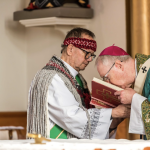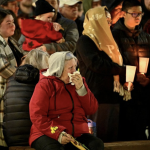VANCOUVER (CCN) — Archbishop Richard Smith and B.C. Court of Appeal Justice Lauri Ann Fenlon both urged Vancouver Catholic lawyers to take seriously their responsibility to their faith and to the common good at the Red Mass and dinner hosted by the St. Thomas More Catholic Lawyers Guild.
Fenlon, who has served on the Supreme Court of B.C. and the Court of Appeal, spoke at the dinner about the necessity for Catholic lawyers to integrate their faith with their professions, not only for their own good but for the good of society as a whole.
“There is no secular neutral,” said Fenlon. “Everyone has a belief system, whether grounded in religion or otherwise. We must push back against the undemocratic and illiberal tendency of our day towards civic totalism, where there is only one acceptable view and all others are to be silenced.”
As lawyers, she said, “we can speak about the need for true tolerance and pluralism in a diverse society like ours. A functioning democracy demands no less.”
People have forgotten where the foundation of Western ideas about human rights comes from, she added. “People don’t realize that Christ is the source of the once-radical proposition that all human beings are created equal, that each person has inherent dignity.”
“It was the Church in the 19th century that championed the rights of workers to strike, to form unions, and the right to a living wage; it was the Church that established schools, universities, shelters, and hospitals through all the centuries, long before governments took on some of that work. Even today, faith-based institutions provide so much of what is needed by those who are vulnerable.”
“Law … is a noble profession when it’s informed by faith,” she said. “It’s also a vocation, a vocation that serves the good of your clients, the good of your colleagues, and in ways large and small, the common good.”
Justice Fenlon was appointed to the B.C. Court of Appeal in 2015 after serving on the B.C. Supreme Court since 2008. Before joining the bench, she practised civil, family, administrative, commercial, privacy, and health law and was called to the B.C. Bar in 1985.
During the Red Mass at Holy Rosary Cathedral, Archbishop Smith told the legal professionals that the occasion offered a chance to “speak of the relation between the rule of law and the rule of faith … a matter that for many in a pluralized society has long lost its seriousness, but which … rests at the heart of your lives as Christians and your profession as judges and lawyers.”
In this deeply disordered time, he said, each person is dealing “with the fallout from disordered existence.” Lawyers in particular face “a type of existential dissonance” when they seek to “resolve, with the insights of the law and within its parameters, the crises that fracture family life and weaken civil institutions.”
While the judiciary and legal professions serve the political community through “necessary reference to the rule of law,” the Church does so through reference to “the rule of faith,” he said. The two are “not parallel streams of thought and fields of action, but are inseparably united and must intersect and enrich one another.”
That connection, he said, becomes clear when we recognize that both “insist on obedience to precept as a general principle of right order.” For the Catholic jurist, the two rules unite in obedience to the “fundamental commandment grounding and ordering the entirety of human existence – namely, loving and attentive obedience to every word that comes from the mouth of Jesus Christ.”
Flowing from this rule of faith are the limits the rule of law places on the actions of both the state and citizens to protect the “free exercise of conscience and religion,” both “indispensable to right order.”
Archbishop Smith said the Gospel reading, in which Christ is warned that Herod seeks to kill him (Luke 13:31–35), and the example of St. Thomas More, “remind us that the state, endowed with broad powers, will always struggle with the temptation to be intolerant of any moral mindset that differs from and challenges its own.”
“When raw state power is unbridled, freedom of religion is soon violated, and profound societal discord rapidly follows,” he said. “In the service of a rightly ordered polity, the rule of law and the rule of faith are both necessary and must work in support of one another to secure and protect this and all authentic human rights.”
This story has been corrected. It previously stated that Justice Lauri Ann Fenlon was a retired B.C. Supreme Court Justice. She is in fact a B.C. Court of Appeal justice.




